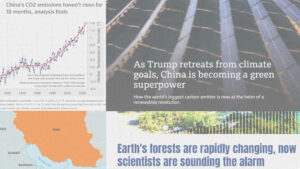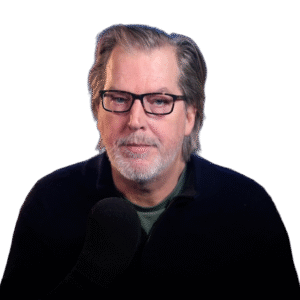Nate offers a short monologue on why our culture is “energy blind” and the implications.
In French, we have a motto that says that a simple drawing is often better than a long explanation. Jean-Marc Jancovici Carbone 4 President
That’s very understandable because with left atmosphere thinking, one of the problems is that you see everything as a series of problems that must have solutions. Iain McGilchrist Neuroscientist and Philosopher
We can’t have hundreds and hundreds of real relationships that are healthy because that requires time and effort and full attention and awareness of being in real relationship and conversation with the other human. Nate Hagens Director of ISEOF
This is the crux of the whole problem. Individual parts of nature are more valuable than the biocomplexity of nature. Thomas Crowther Founder Restor
Show Notes & Links to Learn More
Download transcript00:43 – The Great Simplification – Full Movie
01:26 – Everything requires an energy conversion
03:04 – A barrel of oil is worth ~5 years of human labor (Section 4.3)
04:38 – Energy is not accounted for in economics and production estimations
05:25 – We use energy as principal, but treat it like interest
05:37 – We use 100 billion barrel of oil equivalents of fossil hydrocarbons per year, globally
06:19 – We don’t include resource creation or pollution streams in our prices
06:44 – Massive wealth growth due to fossil hydrocarbons
07:18 – The average American uses 3,100 lbs of coal/year
08:17 – Steve Keen
08:49 – We are drawing down energy 10 million times faster than it was created
09:08 – Global conventional oil extraction has plateaued the last 15 years
09:32 – Oil production has appeared to grow due to debt, QE, and shale oil
09:57 – Oil production likely peaked in late 2018
10:25 – Half (65%*) of US crude oil production is light, tight shale oil
10:35 – What is shale oil?
11:30 – The U.S. produces 11-12 million barrels oil/day, and uses 20 million barrels of oil/day
11:59 – 60-65% of remaining oil is in the 600 mile triangle in Saudi Arabia
12:27 – Oil underpins and predicts economic wealth
13:04 – Geographic distribution of oil
13:27 – The US has used more oil in the last 20 years than any other country ever
13:53 – Rebuildable energy
14:04 – Most renewable energy is electricity, which is only 20% of energy used globally
14:33 – Intermittence
14:47 – Russia reduced natural gas flows to Germany by 25%
16:15 – Fossil energy replaces human labor, which is energetically inefficient, by highly valuable for time (Graph) + Background analysis
17:37 – Gina McCarthy wants social media companies to crack down on anti-renewable content
19:02 – 40% of a barrel of oil is gasoline, the other 60% creates thousands of other products
20:16 – Ecology blindness
21:05 – Putin’s speech 06/17/22 and implications
22:07 – Japan imports all energy, and is creating monetary overlays to subsidize this
23:12 – Italy imports all energy







